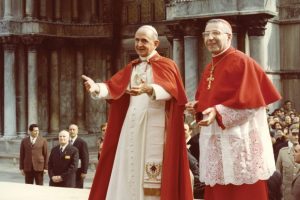When a childhood friend first told me about the love she had for her foster brother, I vowed to become a foster parent someday. Now that “someday” has finally arrived and I’ve begun my fostering journey, I am beset with fears and doubts. Do I really have what it takes to follow through with this long-held dream?
As I contemplate becoming a foster parent, I turn to none other than St. Joseph for help: What did it feel like to be Jesus’ foster father? How did he find the courage to raise the son of God? Did he ever regret his choice?
I’ve gone back through the scant references to Joseph in the Bible, mining for some hidden clue to guide my fostering journey. While meditating on the stories of Joseph, a favorite verse came to mind: “In quietness and trust is your strength” (Isaiah 30:15, NIV). Truly, Joseph’s life is a testament to the strength found in quietly trusting God, and I hope that the example he set will help me walk humbly through the foster care system.
A quiet life speaks loudly
Fostering is not glamorous work. It is a vocation of long nights, uncertain days, and a sharp learning curve. There is little fanfare or gratitude involved. When I face these challenges, I may be tempted to complain about my strife. I pray that, like Joseph, I will find the strength to keep my head down and continue quietly serving the children God entrusts to me.
Though the quiet example of Joseph is well known, the only direct scriptural reference to Joseph’s quiet ways is that he planned to divorce Mary quietly. This decision, though it never came to pass, met his twin criteria of being faithful to the law and protecting his beloved from disgrace (Matthew 1:19). The gospels don’t expound on Joseph’s commitment to quiet faithfulness beyond that one verse.
In fact, Joseph’s silence is so complete that tradition holds that he died before Jesus began his earthly ministry. Is that why the Joseph character is missing from most of the gospels? Or is he absent from the central plot because he performed his role as Jesus’ foster father quietly, knowing that he wasn’t cast on center stage and being quite comfortable with that arrangement?
When Pope Francis declared 2021 the Year of St. Joseph, he described Joseph as a man who “knew how to love with extraordinary freedom. He never made himself the center of things. He did not think of himself, but focused instead on the lives of Mary and Jesus.”
No words of Joseph are recorded in the Bible. As Pope Francis explains, Joseph was a “man who [went] unnoticed, a daily, discreet and hidden presence,” who ultimately played “an incomparable role in the history of salvation.” Likewise, I hope my quiet, daily work with foster children will play a role in the salvation of each child I welcome into my home.
Trust in the tough times
It’s easy to trust when life is comfortable. But there is nothing comfortable about the abuse and neglect many foster children have endured. As a foster parent, I’ll live with the consequences of another parent’s actions. Maybe my foster child will hoard food because she’s lived with hunger. Or perhaps he’ll brace for a crushing blow when he’s in trouble because he’s used to violence. Could witnessing a foster child’s pain make me doubt God’s goodness? When I’m tempted to lose faith, I’ll remember St. Joseph.
Joseph believed in what he could not see—even a virgin birth. Surely Joseph’s reputation suffered when he took Mary as his wife. He may have lost his standing in the community, his role in the synagogue, and even some carpentry jobs. Despite his pain, he continued believing in what he could not see, feel, or understand. His trust in God and devotion to Mary propelled him forward.
When Joseph was called to flee to Egypt, he trusted God enough to follow. As author Melanie Rigney writes in Brotherhood of Saints (Franciscan Media, 2021), “Joseph listened to the Lord… He didn’t worry about having to rebuild his carpentry business when the family had to relocate. Joseph concerned himself with obedience to the Lord and his messengers—and with the protection of his family.” So if Joseph had a recipe for foster care success, it would include listening to the Lord, not worrying about the future, and protecting his family. (I’m taking notes here.)
The other main story of Joseph in the Bible is of his search for Jesus in the temple during Passover (Luke 2:41-50). He and Mary spent three days searching for him, and when they finally found him, Mary said, “Your father and I have been anxiously searching for you.” I wonder how Joseph felt about Jesus’ answer: “Didn’t you know I had to be in my Father’s house?” Those words may have wounded or confused Joseph, but they didn’t stop him from loving and providing for Jesus.
Trust in uncertainty
On top of all the daily tasks of tending to little ones, foster parents carry an extra burden: Utter and complete lack of control over their children’s futures. While biological parents raise their children knowing they will leave home some 18 years later, foster parents raise children with no idea of their launch date.
A foster child may be in your home for a few months or a few years. At any point, the court might step in and return the child to her birth parents. Overnight you can go from caring for that child’s every need to not being allowed any contact with her. Imagine the pain of going so quickly from Mom to stranger. Will I be tempted to withhold my love in self-preservation?
Joseph faced a similar dilemma. It was the tradition of his time for sons to follow their fathers’ career paths. And since Jesus was called a carpenter in Mark 6:3, many scholars believe that Joseph trained Jesus in his own trade. Yet, all those hours of mentorship were undone when Jesus’ true Father called him into the family business.
Would Joseph have taken the time to teach Jesus about carpentry if he knew he’d grow up to be a preacher? Was Joseph disappointed when Jesus traded hammers and nails for the Torah and temple? Or did his commitment to quiet trust allow him to fully invest in Jesus’ life and leave the outcome to God?
Perhaps I’ll also reach a point where every lesson that I teach “my child” will be thwarted when they are no longer considered “my child.” Maybe every plan I have for my foster child will be undone and they won’t lead the lives I’ve imagined for them. But, I hope, like Joseph, I’ll keep sharing my time, talent, and treasure with them anyway.
Fostering requires witnessing pain and accepting uncertainty. These are not easy tasks, but God promised to supply us with strength as we quietly trust in Him. That promise was fulfilled in Joseph’s fostering journey, and I will cling to it in mine.
Image: Wikimedia Commons














Add comment